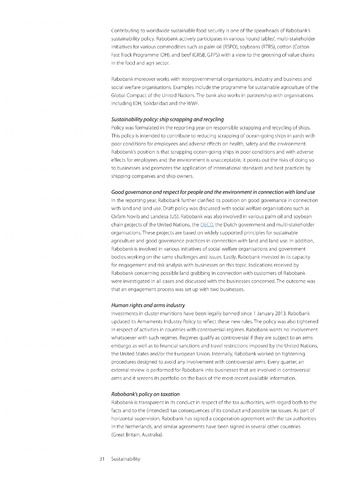Contributing to worldwide sustainable food security is one of the spearheads of Rabobank's
sustainability policy. Rabobank actively participates in various 'round tables', multi-stakeholder
initiatives for various commodities such as palm oil (RSPO), soybeans (RTRS), cotton (Cotton
FastTrack Programme IDH), and beef (GRSB, GTPS) with a view to the greening of value chains
in the food and agri sector.
Rabobank moreover works with intergovernmental organisations, industry and business and
social welfare organisations. Examples include the programme for sustainable agriculture of the
Global Compact of the United Nations. The bank also works in partnership with organisations
including IDH, Solidaridad and the WWF.
Sustainability policy: ship scrapping and recycling
Policy was formulated in the reporting year on responsible scrapping and recycling of ships.
This policy is intended to contribute to reducing scrapping of ocean-going ships in yards with
poor conditions for employees and adverse effects on health, safety and the environment.
Rabobank's position is that scrapping ocean-going ships in poor conditions and with adverse
effects for employees and the environment is unacceptable, it points out the risks of doing so
to businesses and promotes the application of international standards and best practices by
shipping companies and ship owners.
Good governance and respect for people and the environment in connection with land use
In the reporting year, Rabobank further clarified its position on good governance in connection
with land and land use. Draft policy was discussed with social welfare organisations such as
Oxfam Novib and Landesa (US). Rabobank was also involved in various palm oil and soybean
chain projects of the United Nations, the OECD. the Dutch government and multi-stakeholder
organisations. These projects are based on widely supported principles for sustainable
agriculture and good governance practices in connection with land and land use. In addition,
Rabobank is involved in various initiatives of social welfare organisations and government
bodies working on the same challenges and issues. Lastly, Rabobank invested in its capacity
for engagement and risk analysis with businesses on this topic. Indications received by
Rabobank concerning possible land grabbing in connection with customers of Rabobank
were investigated in all cases and discussed with the businesses concerned. The outcome was
that an engagement process was set up with two businesses.
Human rights and arms industry
Investments in cluster munitions have been legally banned since 1 January 2013. Rabobank
updated its Armaments Industry Policy to reflect these new rules.The policy was also tightened
in respect of activities in countries with controversial regimes. Rabobank wants no involvement
whatsoever with such regimes. Regimes qualify as controversial if they are subject to an arms
embargo as well as to financial sanctions and travel restrictions imposed by the United Nations,
the United States and/or the European Union. Internally, Rabobank worked on tightening
procedures designed to avoid any involvement with controversial arms. Every quarter, an
external review is performed for Rabobank into businesses that are involved in controversial
arms and it screens its portfolio on the basis of the most recent available information.
Rabobank's policy on taxation
Rabobank is transparent in its conduct in respect of the tax authorities, with regard both to the
facts and to the (intended) tax consequences of its conduct and possible tax issues. As part of
horizontal supervision, Rabobank has signed a cooperation agreement with the tax authorities
in the Netherlands, and similar agreements have been signed in several other countries
(Great Britain, Australia).
31 Sustainability

